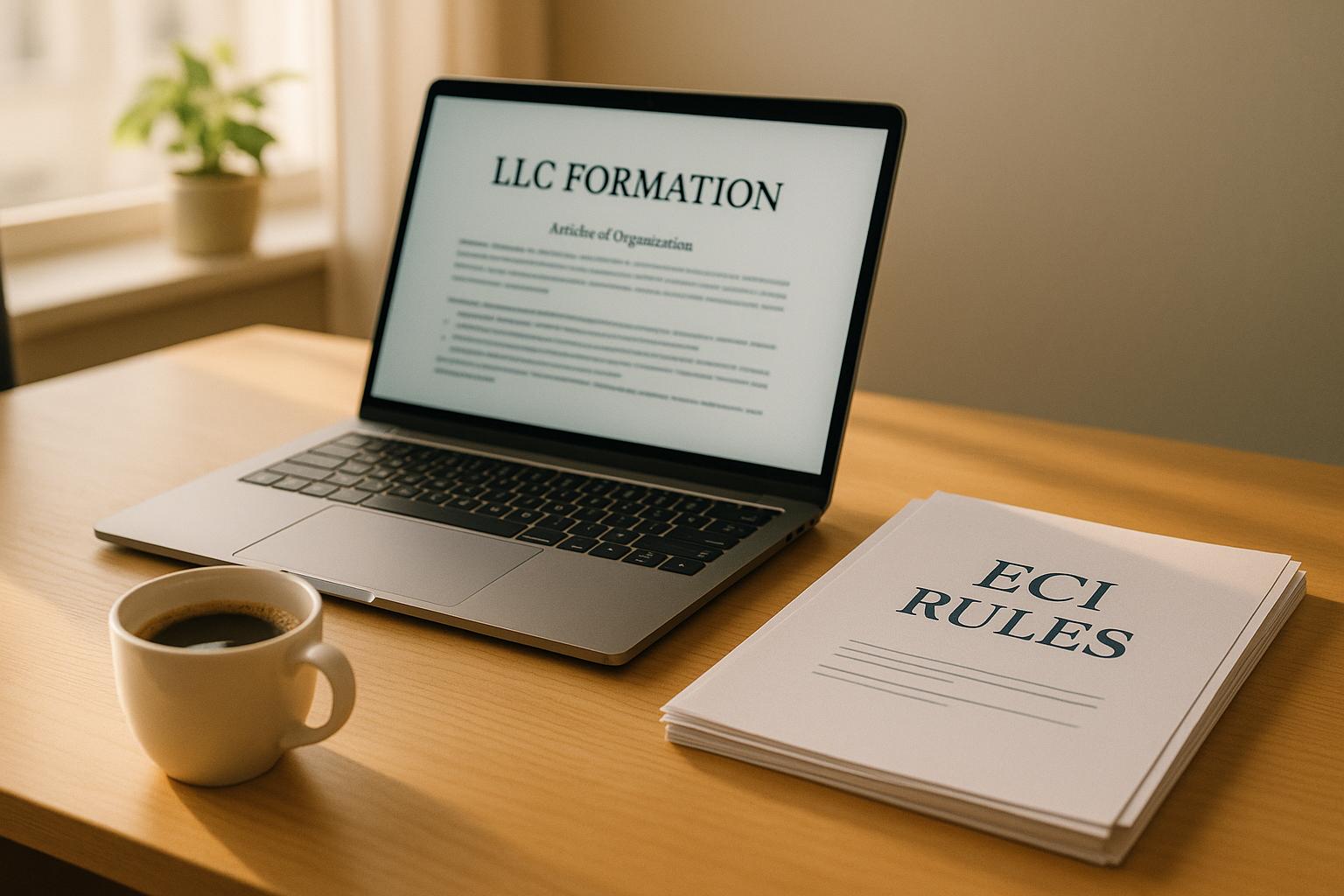Thinking about starting a business in the U.S.? Before you incorporate, take time to understand the market, laws, and business practices. Jumping in too early can lead to unnecessary expenses and mistakes. Here’s a smarter approach:
- Learn First: Test the U.S. market remotely, research regulations, and build partnerships before committing.
- Avoid Costly Mistakes: Early incorporation can mean high legal, tax, and compliance costs - up to $50,000 annually.
- Choose the Right Structure: LLCs are simpler but limit funding options; C-Corps attract investors but involve double taxation.
- Plan Your Entry: Spend time in the U.S. to build connections, adapt products, and hire effectively.
Common Mistakes in Early U.S. Incorporation
Many foreign founders rush into incorporating in the U.S., often leading to costly mistakes.
Managing Costs Before Revenue
Incorporating early can strain finances before revenue begins to flow. Filing fees alone range from $50 to $300. But that’s just the start - operational expenses kick in immediately:
| Expense Category | Annual Cost Range |
|---|---|
| Legal and Regulatory Compliance | $5,000 - $50,000+ |
| Tax Return Preparation | $5,000 - $50,000+ |
| Banking Fees | $840 - $3,600 |
Small businesses in the U.S. typically spend about 11% of their budget on operating costs, with incorporation-related expenses being a major contributor. Without careful planning, these costs can quickly become overwhelming.
Limited Business Structure Options
Picking the wrong business structure - whether an LLC or C Corporation - can have long-term consequences for taxes, compliance, and growth. An LLC might seem appealing due to its simpler setup and pass-through taxation, but it could limit your ability to attract venture capital or offer stock options later. Switching structures later adds unnecessary complexity and costs.
Administrative Burden
Compliance requirements in the U.S. often surprise international founders. Research shows that 44% of foreign businesses spend $500–$5,000 monthly on compliance, while 19% spend over $5,000.
Some of the most challenging aspects include:
- Navigating over 50,000 pages of federal, state, and local regulations.
- Managing complex tax obligations, with combined federal and state corporate tax rates averaging 25.8%.
- Ensuring employment compliance, as benefits make up 31.4% of private-sector compensation.
"The US regulatory environment is a patchwork of federal, state, and local laws that can vary significantly across jurisdictions." - Foothold America
To handle these challenges, you might want to explore professional services like a Professional Employer Organization (PEO) or Employer of Record (EOR). These services typically cost $4,500 to $9,000 per employee annually.
Key Knowledge for U.S. Market Entry
Foreign business owners need a solid grasp of three key areas - U.S. laws, market research, and business practices - before starting their venture in the United States.
U.S. Laws and Regulations
The U.S. legal framework operates across federal, state, and local levels. These layers regulate business formation, taxes, employment, and intellectual property. Here's a quick breakdown:
| Area | Federal Level | State Level | Local Level |
|---|---|---|---|
| Business Formation | Tax ID requirements | Entity registration | Business licenses |
| Taxation | Corporate income tax | Sales tax (varies by state) | Municipal taxes |
| Employment | Immigration laws | Employment rules (e.g., workers' comp) | N/A |
| Intellectual Property | USPTO trademarks and patents | State-level trademarks | N/A |
"Having strong familiarity with topics like business entities, contracting, taxes, IP, immigration, employment, and product liability can help foreign businesses steer clear of legal pitfalls as they grow in the US."
Understanding these legal aspects is the first step. Next, you'll need market research to uncover opportunities and challenges.
Market Research Methods
Market research is essential to understand customer demand, assess competitors, and spot industry trends. Combining primary and secondary research helps validate assumptions and discover potential opportunities.
A real-world example: In March 2023, Spotify used a new Email Verification API to cut its email bounce rate from 12.3% to 2.1% within 60 days. This improved email deliverability by 34% and generated an extra $2.3 million in revenue.
Key elements of market research include:
- Primary Research: Gather customer insights through interviews, surveys, and product testing.
- Secondary Research: Leverage existing data sources like the Census Business Builder and Consumer Expenditure Surveys to analyze trends and behavior.
- Competitive Analysis: Study direct and indirect competitors to identify market gaps and areas where your business can stand out.
These steps provide a strong foundation for navigating the U.S. market confidently.
U.S. Business Practices
Understanding American business culture is critical for building trust and forming lasting relationships. Here are some common practices to keep in mind:
- Meeting Etiquette: Arrive 5–10 minutes early and come prepared with all necessary materials.
- Communication Style: Be direct and clear when presenting ideas or discussing plans.
- Professional Networking: Follow up with new contacts within 24–48 hours and craft a concise, impactful elevator pitch.
Adopting these practices can help you establish credibility and foster meaningful connections. By mastering these three areas, you'll be better prepared to navigate the complexities of entering the U.S. market while avoiding costly missteps.
sbb-itb-fcd17fe
Learning Methods Before Incorporation
Remote Market Testing
Remote market testing helps evaluate the potential of the U.S. market using online tools and virtual methods.
Some common approaches include:
- Digital Analytics: Tools like Google Analytics and social media insights can track how U.S. visitors engage with your brand.
- Customer Surveys: Surveys targeted at potential U.S. customers can help confirm whether your product fits the market.
- A/B Testing: Experiment with different pricing, messaging, or features tailored specifically for U.S. audiences.
These methods provide valuable insights that can guide future strategies, including partnerships with local experts.
Business Partnerships
Collaborating with U.S. partners offers a practical way to navigate the market and avoid common challenges.
"This can be a reality for the newly-arrived outsider. If you're a local, you know how much a good lawyer should cost, who to contact, and what to avoid. As a newcomer it can be difficult to assess a situation no matter how long you look at it, even though all the information is 'knowable' in a concrete way. It just takes a bit of time."
- Will Grogan, VanMoof
A great example is Elvie, which engaged in 30 strategic conversations with U.S. entrepreneurs and experts. These discussions helped them pinpoint market opportunities and refine their plans before officially entering the market.
Direct Market Experience
Spending time in the U.S. provides a deeper understanding of the market and helps establish key relationships. Many European companies dedicate six months onsite to get a firsthand look at local dynamics.
"My view is that founders should spend six months in the U.S. before deciding on next steps. Familiarity with the market is one of the most predictive factors of success when going abroad."
- Ari Salonen, Midaxo
The experience of Secret Escapes highlights the importance of being on the ground:
"Preparation is key. We had senior staff travel to the US to scope out offices, interview potential candidates for roles, and we ran, and continue to run, certain group operations in the UK – marketing, CRM, customer service, finance, product and tech. It makes no sense to replicate central functions for what should be a trading hub. Centralize as much as possible, but for us, human relationships with hotel partners meant we had to double down on building a supply team entirely based in the US. We wouldn't scale without being able to face-to-face."
- Rob Day, Secret Escapes
Being physically present in the U.S. allows companies to:
- Build strong, personal connections with partners and customers
- Learn and adapt to local business practices
- Identify changes needed for products to succeed in the market
- Establish trusted networks of advisors
These methods collectively provide a strong foundation for entering the U.S. market. By leveraging these strategies, businesses can prepare for a smoother transition to formal incorporation and make informed decisions about structure, hiring, and operations.
Steps from Research to Incorporation
Selecting Your Business Structure
Choose a business structure that aligns with your goals in the U.S. Two popular options for foreign founders are LLCs and C-Corporations, each serving different needs.
| Structure Type | Best For | Advantages | Points to Consider |
|---|---|---|---|
| LLC | Small businesses, eCommerce | Pass-through taxation, simpler management | Limited options for raising capital, issues with ECI |
| C-Corporation | Startups seeking investors | Investor-friendly, clear organization | Double taxation, more administrative complexity |
States like Delaware (and recently Nevada and Wyoming) are often preferred for incorporation due to their business-friendly legal systems and established frameworks.
Hiring U.S. Employees
After selecting your structure, the next step is building your team. Here's what you'll need to do:
- Obtain an Employer Identification Number (EIN) for tax and payroll purposes.
- Review immigration requirements to explore visa options like O-1 or L-1 for hiring foreign talent.
- Register your business in the states where it will operate.
Setting Up Business Systems
With your team in place, it's time to establish the systems that will keep your business running smoothly:
1. Meet Legal Requirements
File necessary legal forms, such as the BE-13, to comply with U.S. regulations.
2. Open a U.S. Bank Account
Set up a business bank account after getting your EIN. This step ensures clear financial record-keeping.
3. Bring in Professional Support
Consider hiring experts to help navigate the complexities of operating in the U.S., including:
- Immigration attorneys
- Legal advisors
- Tax consultants
Staying on top of documentation and regulatory requirements will save you from expensive mistakes down the road.
Conclusion: Planning Your U.S. Entry
Entering the U.S. market successfully requires careful preparation and timing. A "learn first, incorporate later" strategy helps entrepreneurs sidestep costly errors while laying the groundwork for a solid presence.
"Starting a business involves much more than having a great idea - it requires careful planning, attention to detail, and ensuring that your legal foundations are in place." - Borderless Counsel ®
Here’s a practical three-phase approach:
-
Market Validation
Start by testing the market remotely and building partnerships. As UpWest explains:
"From our perspective, it's never too early. That may sound a little aggressive at first, but it's critical for early stage startups targeting the US market to be here talking to potential customers, gaining exposure to the ecosystem, and starting to establish a presence." - UpWest
- Legal Framework Collaborate with corporate and immigration attorneys to structure your entry correctly. You might explore initial opportunities with a B-1 visitor visa while refining your business strategy. Setting up a proper legal framework ensures compliance with U.S. laws and supports your early market efforts.
-
Professional Support Network
Build a reliable team of experts to guide you:
- Business attorneys for contract reviews and compliance
- Tax specialists for financial planning
- Immigration professionals for visa strategies
- Accountants for streamlined record-keeping
This phased approach combines market insight, legal preparation, and professional guidance.
FAQs
Why is it beneficial for foreign founders to delay incorporating in the U.S.?
Delaying incorporation in the U.S. can be a smart strategy for foreign founders. It gives you time to thoroughly understand the U.S. market, legal requirements, and business environment before committing to incorporation. This approach helps you avoid costly mistakes and ensures you're better prepared for long-term success.
By focusing on learning first, you can identify potential challenges, explore market opportunities, and develop a clear strategy for expansion. This not only saves resources but also streamlines the process when you're ready to officially establish your business in the U.S.
What are some practical ways for foreign entrepreneurs to explore the U.S. market before incorporating?
Foreign entrepreneurs can explore the U.S. market remotely by using virtual offices. These services offer a professional U.S. address, mail handling, and communication tools, helping businesses establish credibility without the need for a physical presence. This approach allows you to test the market, connect with potential customers, and evaluate demand before committing to incorporation.
Additionally, consider leveraging online resources, such as market research tools, webinars, or workshops focused on U.S. business regulations and strategies. By gathering insights and building an understanding of the market, you can make more informed decisions about your expansion plans.
What are the key legal and compliance challenges foreign businesses face when incorporating in the U.S., and how can they address them?
Foreign businesses often encounter several legal and compliance hurdles when incorporating in the U.S. Key challenges include misclassifying employees, failing to register in all states where they conduct significant business, and making errors in tax filings. Additionally, businesses may unintentionally violate privacy or anti-discrimination laws or neglect to secure required insurance.
To address these issues effectively, consult with experienced legal and tax professionals to ensure compliance with U.S. regulations. It's also crucial to establish a solid legal foundation by selecting the right business structure, registering your business name, obtaining necessary licenses and permits, and drafting clear, enforceable contracts. Partnering with a local expert can further simplify navigating the complexities of U.S. laws and regulations.

.svg)




